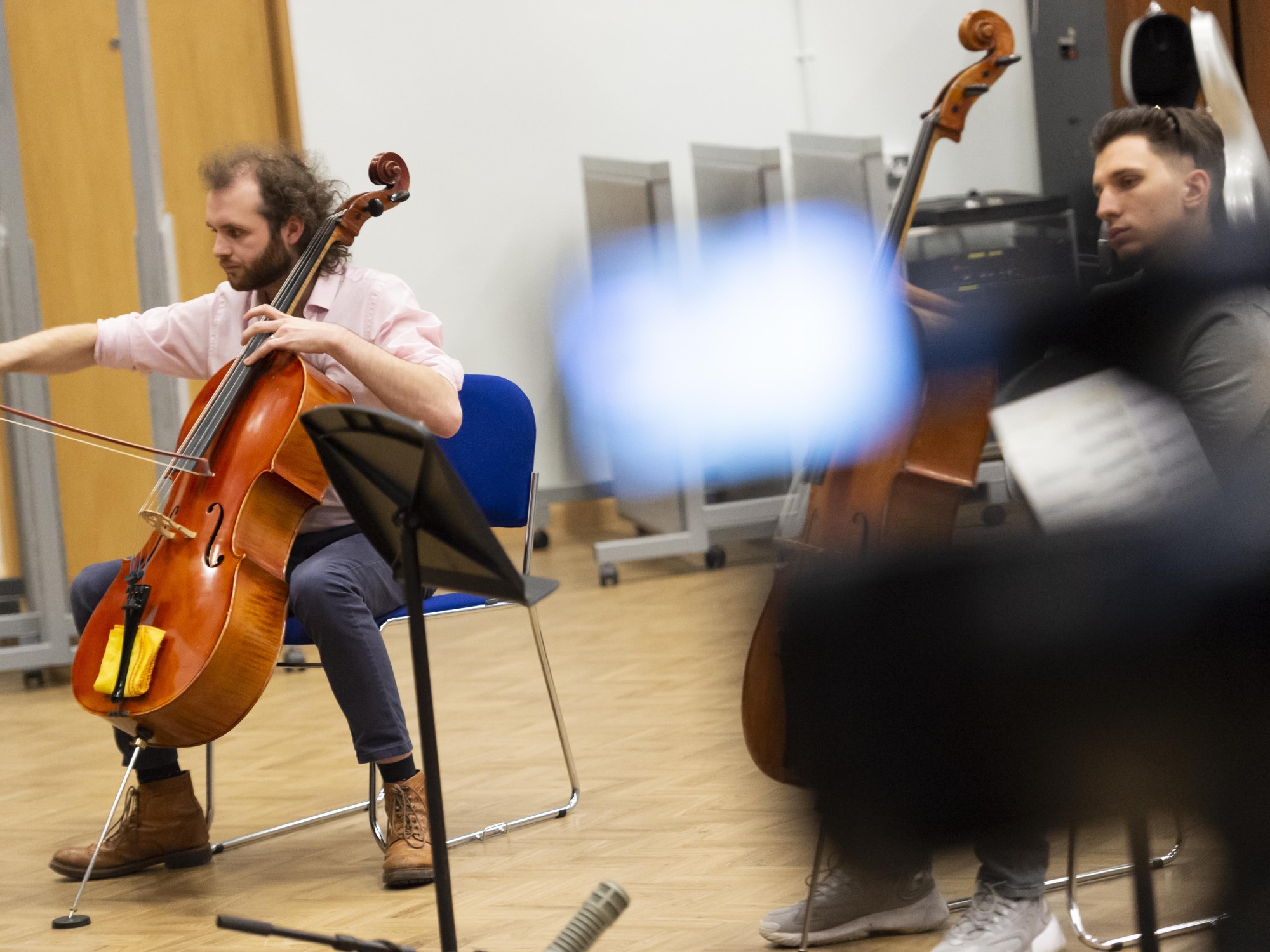
- Music
PhD Music
We are a highly respected authority in musical research and sound technology at Surrey. Thanks to our renowned expertise in musicology, performance, and composition, and the prestige of the Institute of Sound Recording, we can count many household names in entertainment, audio technology and the recording industry among our partners, collaborators, and alumni.
4,138+ people have created a bespoke digital prospectus
Why choose this
programme?
- Our research in music brings together a broad range of interconnected subject areas, focused in our internationally acclaimed research centres, housed in state-of-the-art facilities.
- We are highly collegiate, with a close-knit and supportive academic environment. Academic members of staff are well known internationally for their exceptionally strong research profiles.
- We are home to the Digital World Research Centre, Institute of Austrian and German Music Research, Institute of Sound Recording and the International Guitar Research Centre.
- We belong to TECHNE, an Arts and Humanities Research Council (AHRC)-funded doctoral training partnership, which provides access to comprehensive academic and professional training programmes, as well as the possibility of funding for your studies.
- Our new distance-learning route allows you to pursue doctoral research with full academic support, remote supervision, and access to online resources, without needing to relocate or interrupt your professional and/or caring commitments.
Statistics
100%
Of our music and media research graduates are in employment or further education (Graduate Outcomes 2025, HESA)
Research excellence
We are ranked in the top 20 for the quality of our research outputs - Research Excellence Framework (REF) 2021
100%
Of our music research students are satisfied with the experience of their research degree programme (Postgraduate Research Experience Survey 2025).
What you will study
Our research degrees prepare you for success at each stage of your PhD project development. The structure of our Music PhD is designed to provide intensive graduate preparation for a future career and is suitable for either part-time or full-time candidates.
As a postgraduate researcher, you will conduct a research project within one of our areas of research strengths. Completion of the programme entails submission of a thesis, the submission of practice if undertaking a practice-based PhD, and an oral viva with external examiners.
PhD students can expect three levels of research training: university-level, department-level and subject-specific.
University-level training is provided by the Postgraduate Skills Development Programme and the University Library including a PhD induction, workshops on writing skills and preparation for the confirmation and viva. There is also an annual student-led University postgraduate conference.
Department-level training is offered in the form of interdisciplinary seminars, reading groups, visiting speaker events and conferences.
You will also receive subject-specific training that will vary depending on your programme.
Assessment
Your final assessment will be based on the presentation of your research in a written thesis, which will be discussed in a viva examination with at least two examiners.
You have the option of preparing your thesis as a monograph (one large volume in chapter form) or in publication format (including chapters written for publication), subject to the approval of your supervisors.
Location
You can study for your PhD in person here in Surrey on our Stag Hill campus or by distance learning online.
Research themes
- Composition
- 20th-century concert music, especially Mahler and 20th-century English composers
- Performance studies and techniques
- Guitar history, practice, and composition
- Popular music styles, particularly rock, jazz, electronic dance music
- Analysis
- Aesthetics of sound and music
- Contemporary music and its composition and performance
- Critical musicology
- Music for screen
- Biography
- Improvisation.
Discover more about our music and media research.
See a full list of all our music and media academic staff.
Research support
The professional development of postgraduate researchers is supported by the Doctoral College, which provides training in essential skills through its Researcher Development Programme of workshops, mentoring and coaching. A dedicated postgraduate careers and employability team will help you prepare for a successful career after the completion of your PhD.
Facilities
Facilities include industry-specification sound-recording studios, music-practice rooms, edit suites, and venues for concert performance and musical theatre.
We have doubled the facilities space for music and media. Our Performing Arts Technology Studios have been upgraded and complemented by a £1.7m investment in state-of-the-art production and media suites.
All studios, edit rooms and acoustic rooms in the new space are linked by a new Dante digital audio network, providing audio interconnection between each room, plus video interconnects for flexible configurations of the recording spaces and studios.


Ali Afshari
Student - Music PhD


Anne Marie Cundy
Student - Music PhD
UK qualifications
Applicants are expected to hold a good honours degree and usually an MA in a relevant arts subject or appropriate professional experience.
English language requirements
IELTS Academic: 6.5 or above (or equivalent) with 6.0 in each individual category.
These are the English language qualifications and levels that we can accept.
If you do not currently meet the level required for your programme, we offer intensive pre-sessional English language courses, designed to take you to the level of English ability and skill required for your studies here.
Selection process
Selection is based on applicants:
- Meeting the expected entry requirements and providing all relevant documents including a satisfactory research proposal
- Being shortlisted through the application screening process
- Completing a successful interview
- Providing suitable references.
Fees per year
Explore UKCISA's website for more information if you are unsure whether you are a UK or overseas student. View the list of fees for all postgraduate research courses.
* Please note: any start date other than September will attract a pro-rata fee for that year of entry (75 per cent for January, 50 per cent for April and 25 per cent for July).
July 2026 - Full-time
- UK
- £5,006
- Overseas
- £23,400
July 2026 - Full-time with Distance Learning
- UK
- £5,006
- Overseas
- £23,400
July 2026 - Part-time
- UK
- £2,503
- Overseas
- £11,700
July 2026 - Part-time with Distance Learning
- UK
- £2,503
- Overseas
- £11,700
October 2026 - Full-time
- UK
- £5,238
- Overseas
- £24,300
October 2026 - Full-time with Distance Learning
- UK
- £5,238
- Overseas
- £24,300
October 2026 - Part-time
- UK
- £2,619
- Overseas
- £12,200
October 2026 - Part-time with Distance Learning
- UK
- £2,619
- Overseas
- £12,200
January 2027 - Full-time
- UK
- £5,238
- Overseas
- £24,300
January 2027 - Full-time with Distance Learning
- UK
- £5,238
- Overseas
- £24,300
January 2027 - Part-time
- UK
- £2,619
- Overseas
- £12,200
January 2027 - Part-time with Distance Learning
- UK
- £2,619
- Overseas
- £12,200
April 2027 - Full-time
- UK
- £5,238
- Overseas
- £24,300
April 2027 - Full-time with Distance Learning
- UK
- £5,238
- Overseas
- £24,300
April 2027 - Part-time
- UK
- £2,619
- Overseas
- £12,200
April 2027 - Part-time with Distance Learning
- UK
- £2,619
- Overseas
- £12,200
- Annual fees will increase by 4% for each year of study, rounded up to the nearest £100 (subject to legal requirements).
Additional costs
There are additional costs that you can expect to incur when studying at Surrey.
Funding
A Postgraduate Doctoral Loan can help with course fees and living costs while you study a postgraduate doctoral course.
Studentships
Browse our frequently updated list of funded studentships open for applications.
Application process
Applicants should contact potential supervisors before submitting an application via the website. Please refer to section two of our application guidance.
Apply online
To apply online first select the course you'd like to apply for then log in.
Select your course
Choose the course option you wish to apply for.
Sign in
Create an account and sign into our application portal.
The closing date is the last day this month is available for applications, but if you are applying through a studentship you must follow the deadline on the advert to be eligible.
ApplyThe closing date is the last day this month is available for applications, but if you are applying through a studentship you must follow the deadline on the advert to be eligible.
ApplyThe closing date is the last day this month is available for applications, but if you are applying through a studentship you must follow the deadline on the advert to be eligible.
ApplyThe closing date is the last day this month is available for applications, but if you are applying through a studentship you must follow the deadline on the advert to be eligible.
ApplyThe closing date is the last day this month is available for applications, but if you are applying through a studentship you must follow the deadline on the advert to be eligible.
ApplyThe closing date is the last day this month is available for applications, but if you are applying through a studentship you must follow the deadline on the advert to be eligible.
ApplyThe closing date is the last day this month is available for applications, but if you are applying through a studentship you must follow the deadline on the advert to be eligible.
ApplyThe closing date is the last day this month is available for applications, but if you are applying through a studentship you must follow the deadline on the advert to be eligible.
ApplyThe closing date is the last day this month is available for applications, but if you are applying through a studentship you must follow the deadline on the advert to be eligible.
ApplyThe closing date is the last day this month is available for applications, but if you are applying through a studentship you must follow the deadline on the advert to be eligible.
ApplyThe closing date is the last day this month is available for applications, but if you are applying through a studentship you must follow the deadline on the advert to be eligible.
ApplyThe closing date is the last day this month is available for applications, but if you are applying through a studentship you must follow the deadline on the advert to be eligible.
ApplyThe closing date is the last day this month is available for applications, but if you are applying through a studentship you must follow the deadline on the advert to be eligible.
ApplyThe closing date is the last day this month is available for applications, but if you are applying through a studentship you must follow the deadline on the advert to be eligible.
ApplyThe closing date is the last day this month is available for applications, but if you are applying through a studentship you must follow the deadline on the advert to be eligible.
ApplyThe closing date is the last day this month is available for applications, but if you are applying through a studentship you must follow the deadline on the advert to be eligible.
ApplyAfter registration
Students are initially registered for a PhD with probationary status and, subject to satisfactory progress, subsequently confirmed as having PhD status.
About the University of Surrey
Need more information?
Contact our Admissions team or talk to a current University of Surrey student online.
Code of practice for research degrees
Surrey’s postgraduate research code of practice sets out the University's policy and procedural framework relating to research degrees. The code defines a set of standard procedures and specific responsibilities covering the academic supervision, administration and assessment of research degrees for all faculties within the University.
Download the code of practice for postgraduate research admissions (PDF).
Terms and conditions
When you accept an offer to study at the University of Surrey, you are agreeing to follow our policies and procedures, student regulations, and terms and conditions.
We provide these terms and conditions at the offer stage and are shown again at registration. You will be asked to accept these terms and conditions when you accept the offer made to you.
View our generic registration terms and conditions (PDF) for the 2025/26 academic year, as a guide on what to expect.
Disclaimer
This online prospectus has been published in advance of the academic year to which it applies.
Whilst we have done everything possible to ensure this information is accurate, some changes may happen between publishing and the start of the course.
It is important to check this website for any updates before you apply for a course with us. Read our full disclaimer.





